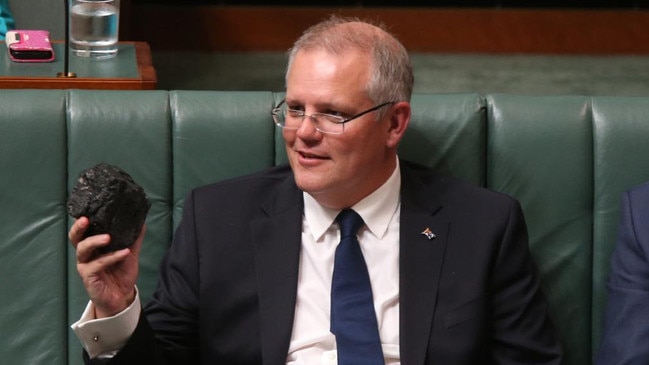
Still the largest source of our power, still our second biggest export, coal has been placed in the Coalition’s fantasy technology basket, to be revisited one day in the mythical future when renewables don’t need subsidies, pumped hydro creates more energy than it consumes, China’s carbon market comes into operation, and Australia wins soccer’s World Cup 6-0 against Brazil.
The new lowest common denominator on coal is we continue to export it but there are no circumstances in which we build a coal-fired power station. This is how conservative governments embrace long-term strategic defeat. They win a thousand tactical victories as they march backwards. The Coalition has lost the coal argument. It came into office in 2013 never dreaming it would abandon coal, but that is what it has done.
Labor and the Greens have won the argument even as they have lost the elections. The conservatives — meaning the Liberals and the Nationals — have accepted defeat. The Coalition has a good chance of retaining government by arguing that it will implement the left’s policies more carefully, cautiously, modestly, competently and with less economic damage than Labor would.
The abandonment of coal has serious strategic implications for Australia. We will never recover a robust manufacturing industry without cheap energy and we won’t have cheap energy without coal. The day after the government announced its wish list of fantasy technologies of the future — which any Labor government would have been proud to unveil — AGL Energy dumped a plan for a discounted electricity contract for Victoria’s Portland aluminium smelter. The long and the short of it is that unless the government shells out massive subsidies we are likely to lose aluminium and then steel as we continue, suicidally, our march away from any manufacturing capability.
Don’t think that in abandoning coal-fired power we are reflecting a global trend. The only people who think that are those whose globalism embraces New York and Los Angeles, London and Paris, and almost no other part of the world. This year Germany has opened a new coal-fired power plant. Japan has 20-odd in the works over the next five years.
Ultra-supercritical coal-fired plants — the so-called high-efficiency, low-emissions plants — create about 30 per cent fewer emissions than old coal and a similar amount more than new gas. Such plants are being built in many parts of the world. It is a crazy woke fantasy to think coal is being phased out. Such thinking reflects a spectacular ignorance of Asia, which is becoming an ever bigger part of the global economy.
Not the only story about coal but by far the biggest is China. The Asia Society’s Policy Institute in New York has rounded up the figures in an extremely useful paper, China’s Response to Climate Change. Almost every climate commentator in Australia refuses ever to confront the China figures. Let me offer you a few of them.
This year alone China has approved new coal-fired power plants that can produce 17 gigawatts of energy. That is a huge capacity. And China is accelerating its approval and construction of coal-fired power plants, for that is more than it approved in the previous two years.
Kevin Rudd, in a recent oped in The Washington Post drawing on the Asia Society paper, pointed out that the new coal-fired power plant capacity being developed in China “is larger than the remaining fleet in the United States”.
The Asia Society records that China has 1040GW of coal-fired energy capacity, but this will be 1100GW by the end of the year. The China Electricity Council and the China State Grid both suggest raising this to 1300GW by 2030. Coal is declining slowly as a proportion of China’s energy mix but it is continuing, as these figures show, to increase rapidly in absolute terms.
The report also demonstrates the massive increase in coal, and other fossil fuel use, taking place as part of Beijing’s Belt and Road initiative. Specifically, Chinese finance and support is involved directly in new coal-fired power plants in The Philippines, Vietnam, Indonesia, Bangladesh, Pakistan, Mozambique, Malawi, South Africa, Zimbabwe and Serbia. Beyond China, Indonesia has a huge program of coal-fired power plants being built. Before COVID-19 knocked everything off balance, India was planning to increase its coal-fired electricity generation by almost a quarter over three years.
COVID-19 will slow all this, but only temporarily. What is clear is that coal is booming in most parts of the world not ruled by The New York Times or the BBC. Our corporate leaders, or many of them, are happy to recite the mantra that coal has no future, partly because they want to avoid social media campaigns against them. In the West coal is moving away from public companies and into private equity hands, or into Asian investments directly. None of the expansion of coal outlined above has been denied finance because some Western banks now find coal politically inconvenient.
UN projections are that Africa’s population will increase to 4.5 billion by the end of this century. If any of them want to live above subsistence level they will need cheap energy. Coal is sure to play a big part.
If you are a friend of the environment, indeed if you want to moderate greenhouse gas emissions, you will want Australian coal to be used everywhere that’s possible because ours is the cleanest coal in the world. It’s just a geological fact. If a coal-fired power station in China or India is using Australian coal it will generate fewer greenhouse gas emissions per unit of energy produced than if it is using Chinese or Indian coal.
And as the biggest exporter (though by no means biggest producer) of coal, we could make a contribution by doing something clever on the technology of getting ever lower emissions from ultra-supercritical coal-fired energy plants. By not doing this we make ourselves poorer economically and weaker strategically, while our competitors, economic and strategic, become richer and stronger.
The Liberals, and even more the Nationals, know all this at some level but can no longer make a fight of it. Their political judgment is probably correct. Political parties must always deal with political reality. Gas is at least better than complete renewables madness. But the Coalition had no thought of this when it entered government. Its surrender on coal ought, though, at least be noted, given its grave implications for the national interest.








The biggest story of the moment, the biggest structural change in our politics, is that the Morrison government has admitted comprehensive and probably permanent defeat on coal. It seems like a different era in history when Scott Morrison as treasurer proudly brandished a lump of coal in parliament to demonstrate his party’s commitment to our black gold.